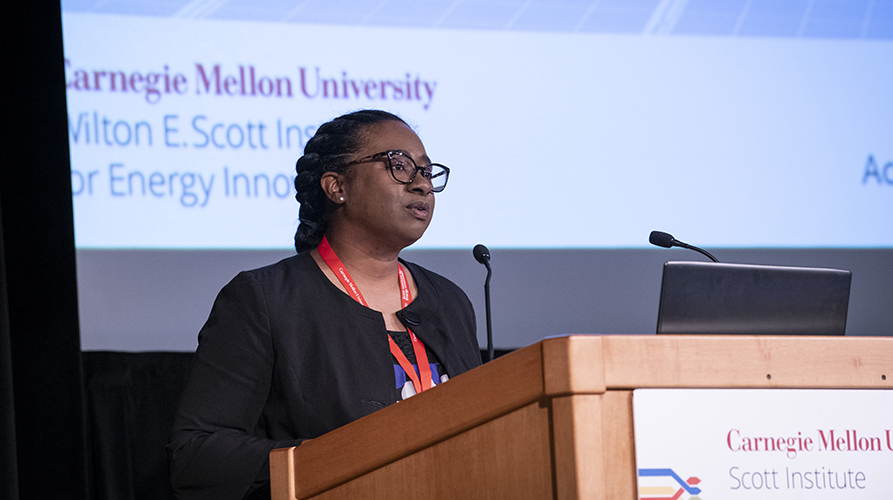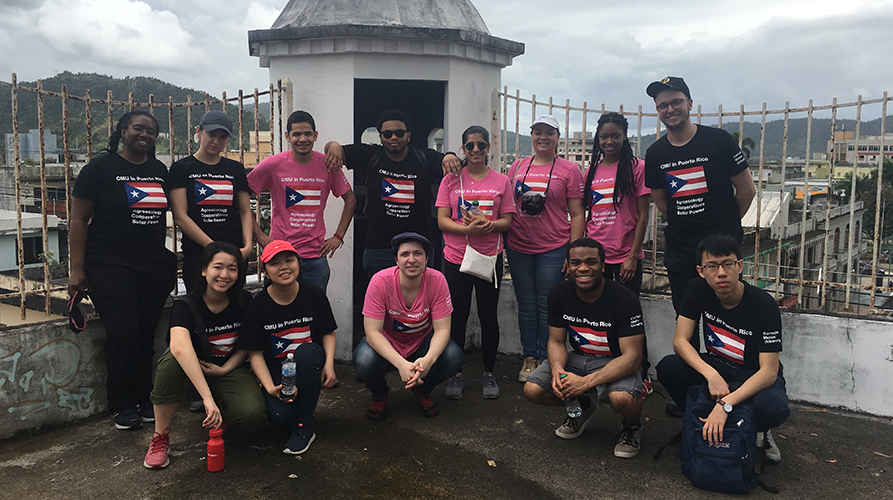Sustainability and Spring Break: CMU in Puerto Rico
By Scottie Barsotti
Heinz College alumna Tiffany Taulton founded a new student organization during her time here that aims to have a lasting impact on Puerto Rico—and on CMU.
In September 2017, Hurricane Maria formed in the Atlantic Ocean. Maria progressed across the Caribbean, wreaking devastation across many island nations, some of which were still reeling from other storms, especially Hurricane Irma which struck only a few weeks prior. On September 20, the U.S. territory of Puerto Rico suffered a direct hit from Hurricane Maria, a disaster causing thousands of deaths, billions of dollars in damage to property and infrastructure, ecological and public health emergencies, and widespread flooding. For nearly a year, some parts of the island were without power or clean drinking water.
Tiffany Taulton (MSPPM ’19) lived in Puerto Rico as a child. She was a first-year student at Heinz College when Maria hit, and she wanted to get Carnegie Mellon University students more engaged with what was happening on the island. In 2018, she arranged an “alternative spring break” relief trip to Puerto Rico for graduate and undergraduate students at CMU.
“CMU in Puerto Rico” is now an official CMU student organization that will live on beyond Taulton’s tenure on campus, with plans to not only visit the island each year, but to provide more comprehensive education to students about the political, economic, and environmental challenges facing Puerto Rico.

Tiffany Taulton speaking during CMU's Energy Week
---
“My thought process in getting Heinz College students to go to Puerto Rico every year is that we’re studying public policy at one of the top schools in the country for environmental policy and management,” said Taulton. “When you think about all the people in government positions at the federal, state, and city level, many are Heinz graduates. I wanted to introduce Heinz students to Puerto Rico so that when they go into their professional lives they will be able to make informed decisions to support policies that help, rather than harm, the island.”
Taulton says that one of the biggest lessons she learned right away was that many people on the U.S. mainland—including CMU students—were not aware that Puerto Rico is part of the United States. She spent the weeks leading up to the first trip getting the group educated about the island’s political and economic status via lunchtime seminars.
“45 percent of people on Puerto Rico live in poverty, and there are many people there who have a college education but can’t get a job,” she said. “Unless you live in a place with a large Puerto Rican population, you may not be aware of these issues at all. I wanted to change that, because people on the mainland need to think more about Puerto Rico and what’s happening there.”
A trip rooted in service, support, and awareness
Taulton emphasizes that the aim of “CMU in Puerto Rico” was to arrive on the island ready to listen and learn about what local residents and organizations need rather than showing up and dictating what needed to be done. The first year, the group took on service projects with independent farms and community organizations throughout the island that were still in recovery. At that point, much of the island still didn’t have power, many residents lacked access to clean drinking water, blue FEMA tarps checked the landscape indicating missing rooftops, and entire ecosystems had been ravaged by flooding.
“We went in recognizing that the people in Puerto Rico had knowledge, talents, and skills, and were better positioned to know what they needed than we were as outsiders. We were there to support the work they were already doing,” said Taulton. “What was really clear was that there were people there who felt forgotten, so I think showing up and really listening, showing them that we cared, made a difference.”
During the second trip, the students volunteered with more urban community organizations. Taulton noticed residents were talking less about recovery and more about rebuilding and revitalizing communities by strengthening connections to their Puerto Rican cultural identity. The CMU students worked on projects led by artist collectives and met with Goldman Environmental Prize-winner Alexis Massol González, founder of the solar power “energy oasis” at Casa Pueblo. His presentation emphasized the importance of using culture to create a shared identity that supported sustainability efforts.
The students spent time both years with faculty and students at the University of Puerto Rico at Mayagüez (UPRM) to present about current projects and exchange ideas. Taulton sees that relationship as having a great deal of potential for both institutions.
“UPRM has a strong engineering program and they’re very involved with local communities on sustainability and resilience projects, including community solar and co-ops. They were excited to hear about what we’re working on at CMU in environmental policy and planning, smart cities, and renewable energy,” said Taulton.
In an effort to deepen the relationship between the schools, students on the second year trip spent an entire day at UPRM in discussions with students and professors about topics including agroecology, solar energy, and environmental justice. The next day, UPRM professors took the CMU group to visit several communities that UPRM students worked with. There, they met with community leaders to get a better understanding of their needs. After the visit, the students decided to support a community-grid solar pilot project with an $8,000 grant taken from funds the club had raised throughout the year—including a $3,000 donation from CMU's Wilton E. Scott Institute for Energy Innovation.
“Power is such an important issue. Some rural areas of Puerto Rico were without power for 11 months following Hurricane Maria. Other places still don’t have power and may never get it restored. It creates a huge problem because people rely on electricity for life-saving equipment like respirators and dialysis machines, not to mention clean water,” said Taulton.
Puerto Rico’s needs go beyond energy
In addition to these trips to Puerto Rico focusing on issues like sustainability and renewable energy, they also served as a reminder to students that community leaders and residents were equally concerned about problems like school closures and political autonomy.
“On our most recent trip, we heard a lot about decolonization. There are more people on the island now who, rather than debating the value of independence versus U.S. statehood, are focused on decolonization as a first step. There’s a feeling that there’s no point in discussing the island’s political future until Puerto Rican residents—not Congress—have the legal authority to decide their status,” said Taulton.
“We spent a lot of time talking about political autonomy and the importance of local governance. We talked about the austerity measures imposed by the Fiscal Control Board that was established to oversee the island’s debt restructuring under PROMESA in 2016 and how democracy can become compromised in places that have external oversight boards—especially when the communities involved are communities of color.”

Participants in the 2019 'CMU in Puerto Rico' trip
---
Creating a non-profit from scratch
Taulton describes her experience creating the “CMU in Puerto Rico” club during her time at Heinz College as essentially creating her own non-profit and then handing it off to new leadership. CMU Engineering and Public Policy senior Frank Andujar Lugo, who was the club’s vice president, will be leading the club into its third year following Taulton’s graduation.
She describes a team project in her first-year Environmental Policy and Planning class that involved creating a recovery and resilience plan for Puerto Rico. That allowed her to spend the entire semester before the first trip thinking about Puerto Rico and analyzing complex problems on the island from agriculture to economics, all the way down to roads, energy and water infrastructure, and FEMA’s response to the 2017 hurricanes.
Taulton took a course in Creating Results Oriented Programming, and used “CMU in Puerto Rico” as her case, creating a logic model and funders presentation for the club. She applied classes in fundraising and multimedia to the club—raising roughly $45,000 over the two years, building a website, developing a social media presence, and creating t-shirts and other marketing materials. All of this in addition to ramping up the pre-orientation outreach and education for students going on the trip.
“I took classes that allowed me to dive deeper into what it was like to run or work for a non-profit, which allowed me to professionalize what I was doing for ‘CMU in Puerto Rico,’” she said.
Perhaps most significantly, Taulton and her team created a speaker series which further connected “CMU in Puerto Rico” across campus as well as with the Puerto Rican community in Pittsburgh. The club hosted a talk with Emmy Award-winning filmmaker Juan Agustin Marquez (The Last Colony) and met with the comic book author Edgardo Miranda-Rodriguez (La Borinqueña).
“This year, we also made time for service projects in Pittsburgh, which helped to underline the relevance of what we’re doing in Puerto Rico and to reinforce the connection that there are community groups doing similar work in Pittsburgh that students can get involved with,” said Taulton.
That brings up another important point. While Puerto Rico’s political and economic situation are nuanced and unique, some of the problems on Puerto Rico are not unique to the island but are being faced by environmental justice communities across the United States. Taulton says in creating the club, she wanted to be intentional about making the connection between what’s going on in Puerto Rico and what’s going on in other places, like Pittsburgh.
“CMU students [on our main campus] live and study in Pittsburgh, and there are communities here that deal with many of the same issues facing Puerto Rico, like homelessness, schools closing, education gaps, food insecurity, asthma rates and air pollution, and so on. It’s a reminder that environmental matters and climate change affect us all. Injustice affects us all.”
In addition to service and education, the students who participate in the “CMU in Puerto Rico” alternative spring break trip find plenty of time to enjoy the island’s natural beauty, local culture, and cuisine—the club emphasizes the importance of spending money in the local economy and patronizing community-owned businesses. Check out photos on the club’s website to get a sense of the experience!